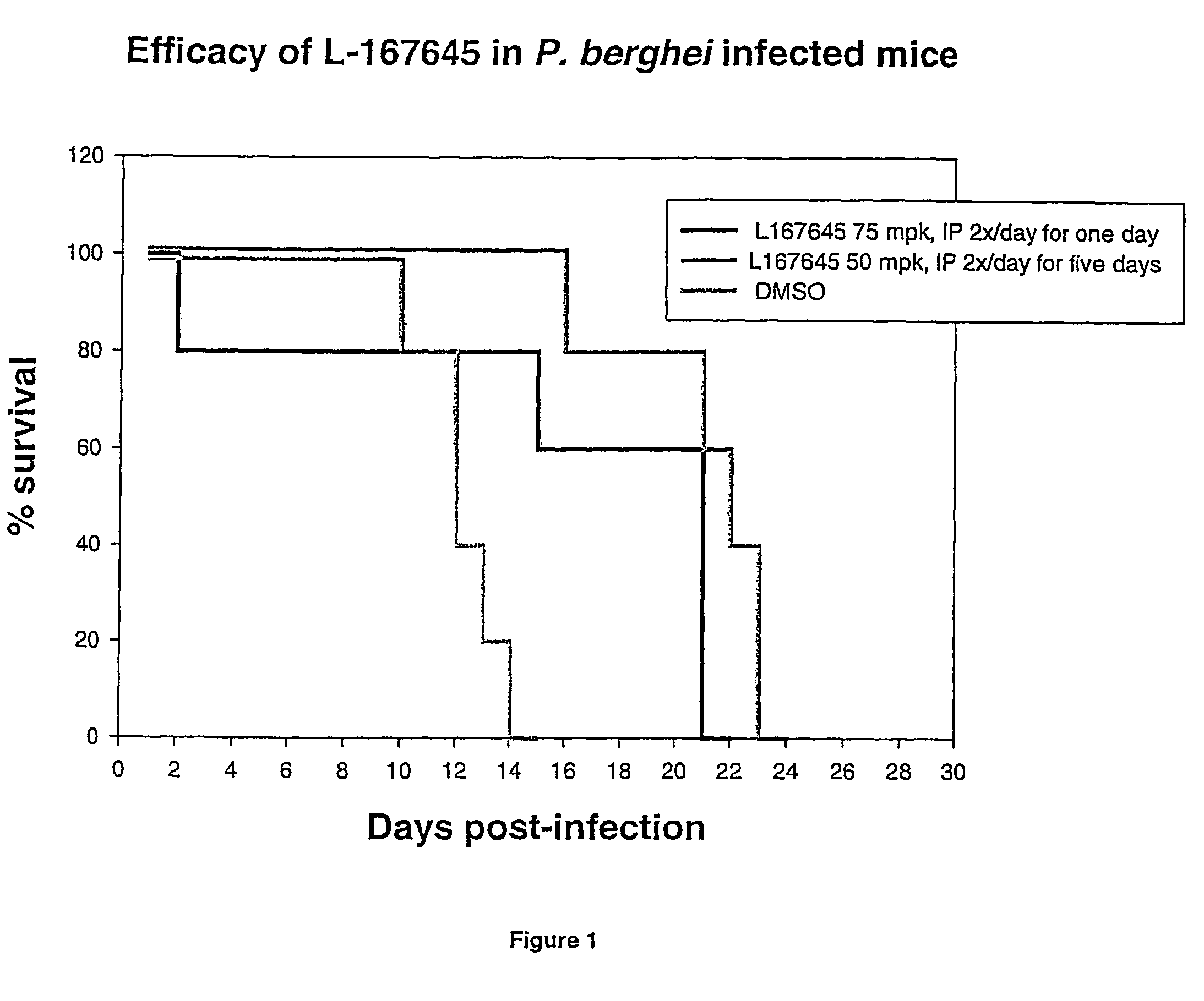Nucleic acids encoding novel cyclic GMP dependent protein kinases from Elmeria maxima
a technology of cyclic gmp and protein kinase, which is applied in the field of new parasite cgmp dependent protein kinase (pkg) encoding genes, can solve the problems of high virulent infections that are rapidly fatal, mild symptoms, and considerable economic loss to owners, and achieve the effect of inhibiting parasitic growth
- Summary
- Abstract
- Description
- Claims
- Application Information
AI Technical Summary
Benefits of technology
Problems solved by technology
Method used
Image
Examples
example 1
[0162](i) Cloning of cDNAs that Code for E. maxima and P. falciparum PKG
[0163]A common strategy was employed to isolate PKG cDNA clones from both E. maxima and P. falciparum parasites. The first step in the cloning strategy involved a coupled reverse transcriptase-polymerase chain reaction (RT-PCR). Using an alignment of the deduced amino acid sequence from cDNA clones coding for E. tenella and T. gondii PKG proteins, areas of sequence identity within the presumptive cGMP-binding and catalytic domains were identified. Degenerate oligonucleotide primers were synthesized based on the following four peptide sequences.
[0164]
Amino AcidPrimerPrimerSequenceOrientationPKG DomainaVKFFEML (Et)sensecGMP-bindingSEQ ID NO.: 5VKFFEML (Tg)SEQ ID NO.: 5bGEYFGERAL (Et)sensecGMP-bindingSEQ ID NO.: 6GDYFGERAL (Tg)SEQ ID NO.: 7cRDLKPENI (Et)antisensecatalyticSEQ ID NO.: 8RDLKPENI (Tg)SEQ ID NO.: 8dHYMAPEV (Et)antisensecatalyticSEQ ID NO.: 9HYMAPEV (Tg)SEQ ID NO.: 9
[0165]Total RNA purified from E. maxim...
example 2
Efficacy of L-167645 Against Plasmodium Species
[0181](i) PFAIV Assay
[0182]The PFAIV assay is an in vitro assay designed to identify potential inhibitors of P. falciparum by measuring the incorporation of tritiated hypoxanthine into parasitized red blood cells.
[0183]PFAIV Assay Protocol
[0184]The following method is an adaptation of the method described by Desjardins, R. E. et al, 1979. AAC Vol 16, p710-718:
[0185]1. Sixty microliters of a solution of RPMI 1640 media plus gentamycin (1:100 dilution) containing the desired concentration of test compound is added to the wells of a 96-well plate. (For titrations, 120 microliters is added to the top well and the compounds are serially diluted into 60 microliters of media.)
[0186]2. Fifty three microliters of parasitized red blood cells is added to the wells. The parasitemia of the culture is approximately 2-3% and the hematocrit is 5%. The red blood cells are diluted in RPMI 1640 media containing 20% human A+ serum and gentamycin.
[0187]3. T...
example 3
Efficacy of L-167,645 Against Eimeria Parasites
[0194](i) Efficacy against E. maxima in vivo
[0195]Several studies have been conducted to evaluate the efficacy of L-167545 against E. maxima in infected chickens. For efficacy studies against E. maxima alone, L-167645 was administered in the feed at doses from 25 to 150 ppm starting on day one. Birds were infected with 3.5×103 E. maxima sporalated oocysts on day 2 and medicated feed was continuously available at the respective doses for the duration of the study. The experiment was terminated on day 8, intestines were removed and homogenized and compound efficacy was estimated by performing oocyst counts. In these studies greater than 99% reduction in oocyst counts was achieved at a dose of 125 ppm L-167645.[0196](ii) In vivo Efficacy of L-167645 Against Mixed-Species Field Isolates of Eimeria Containing E. maxima
[0197]Chicken battery experiments have also been conducted to evaluate L-167645 efficacy against mixed-species field isolate...
PUM
| Property | Measurement | Unit |
|---|---|---|
| temperature | aaaaa | aaaaa |
| pH | aaaaa | aaaaa |
| volume | aaaaa | aaaaa |
Abstract
Description
Claims
Application Information
 Login to View More
Login to View More - R&D
- Intellectual Property
- Life Sciences
- Materials
- Tech Scout
- Unparalleled Data Quality
- Higher Quality Content
- 60% Fewer Hallucinations
Browse by: Latest US Patents, China's latest patents, Technical Efficacy Thesaurus, Application Domain, Technology Topic, Popular Technical Reports.
© 2025 PatSnap. All rights reserved.Legal|Privacy policy|Modern Slavery Act Transparency Statement|Sitemap|About US| Contact US: help@patsnap.com

